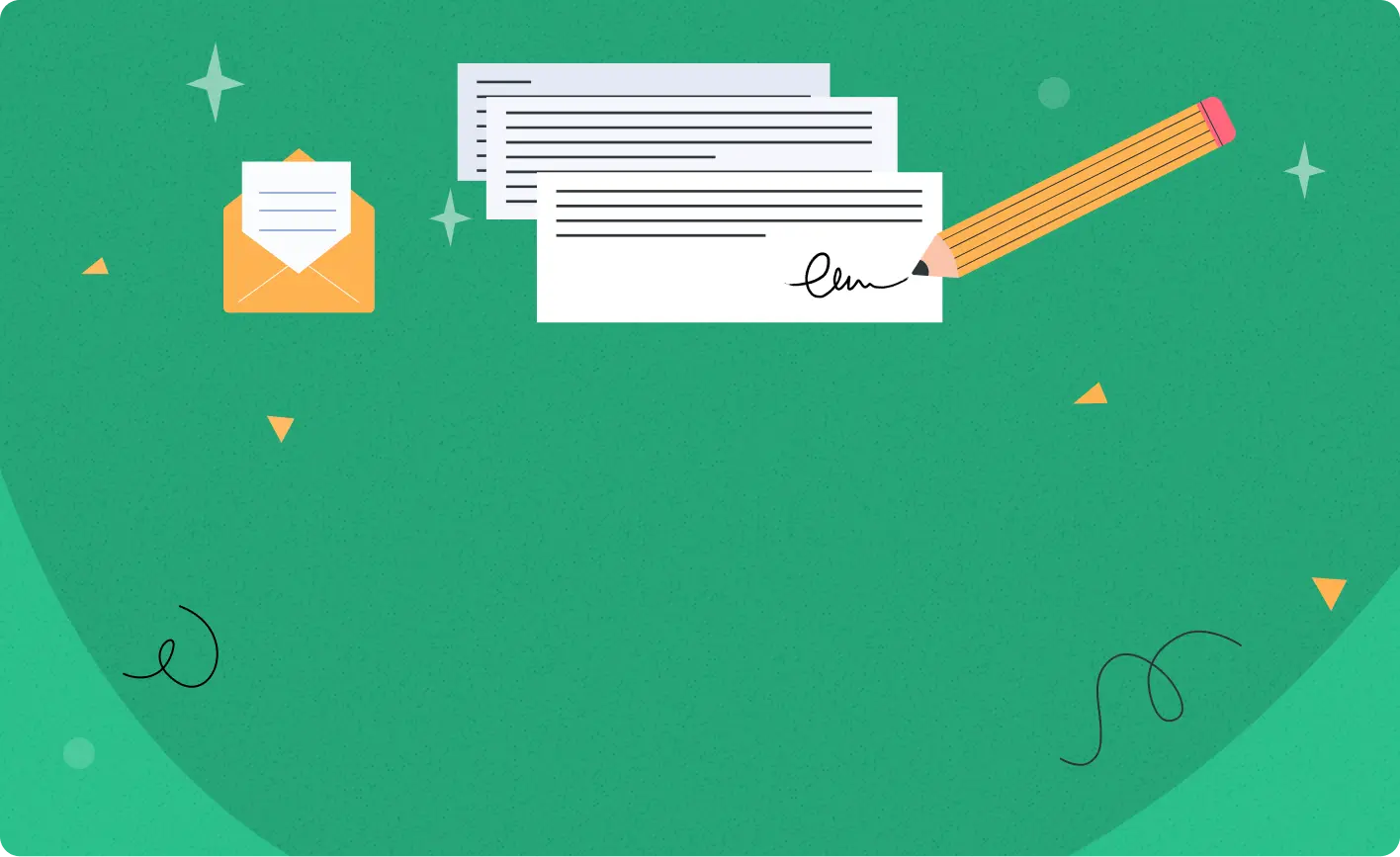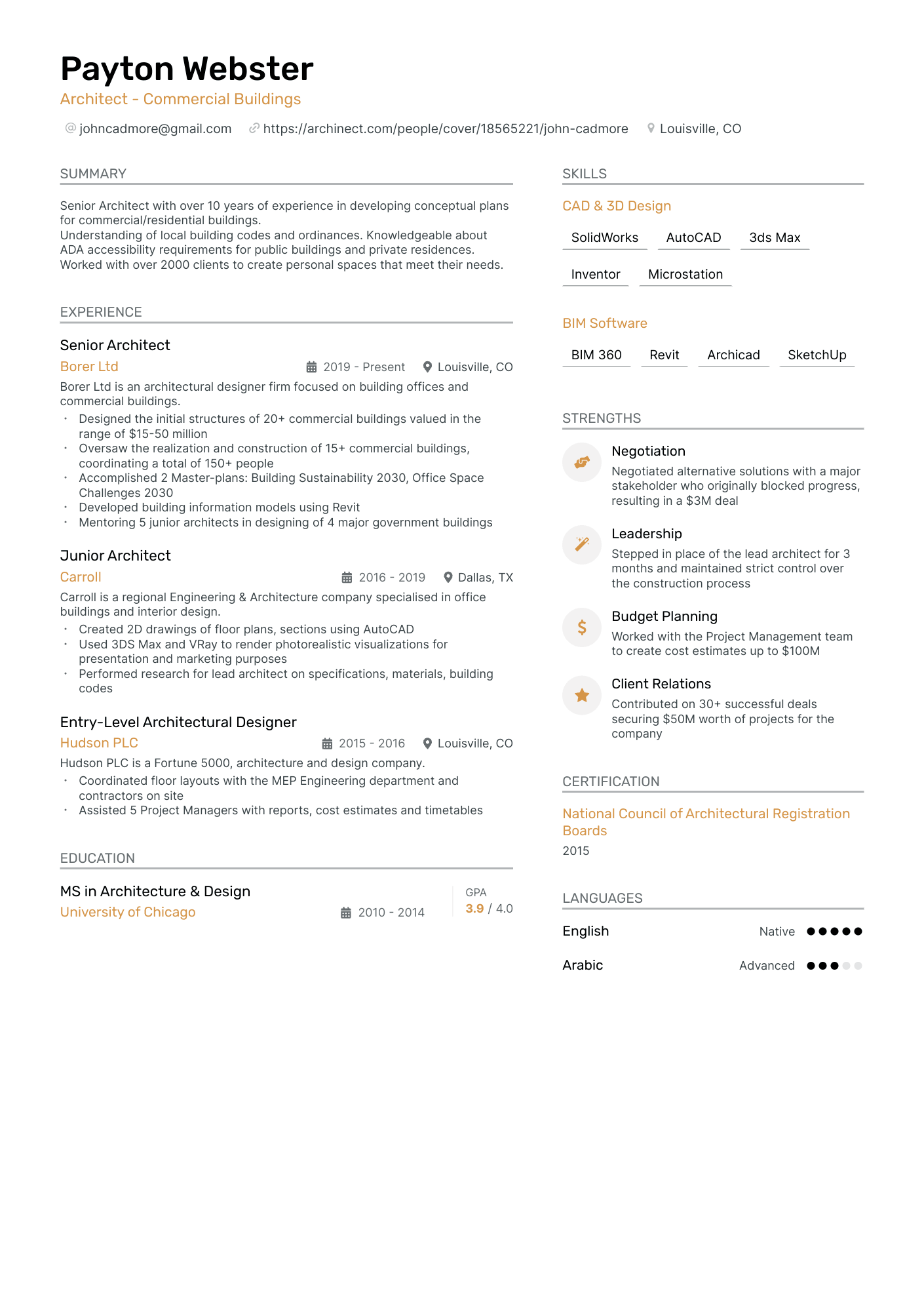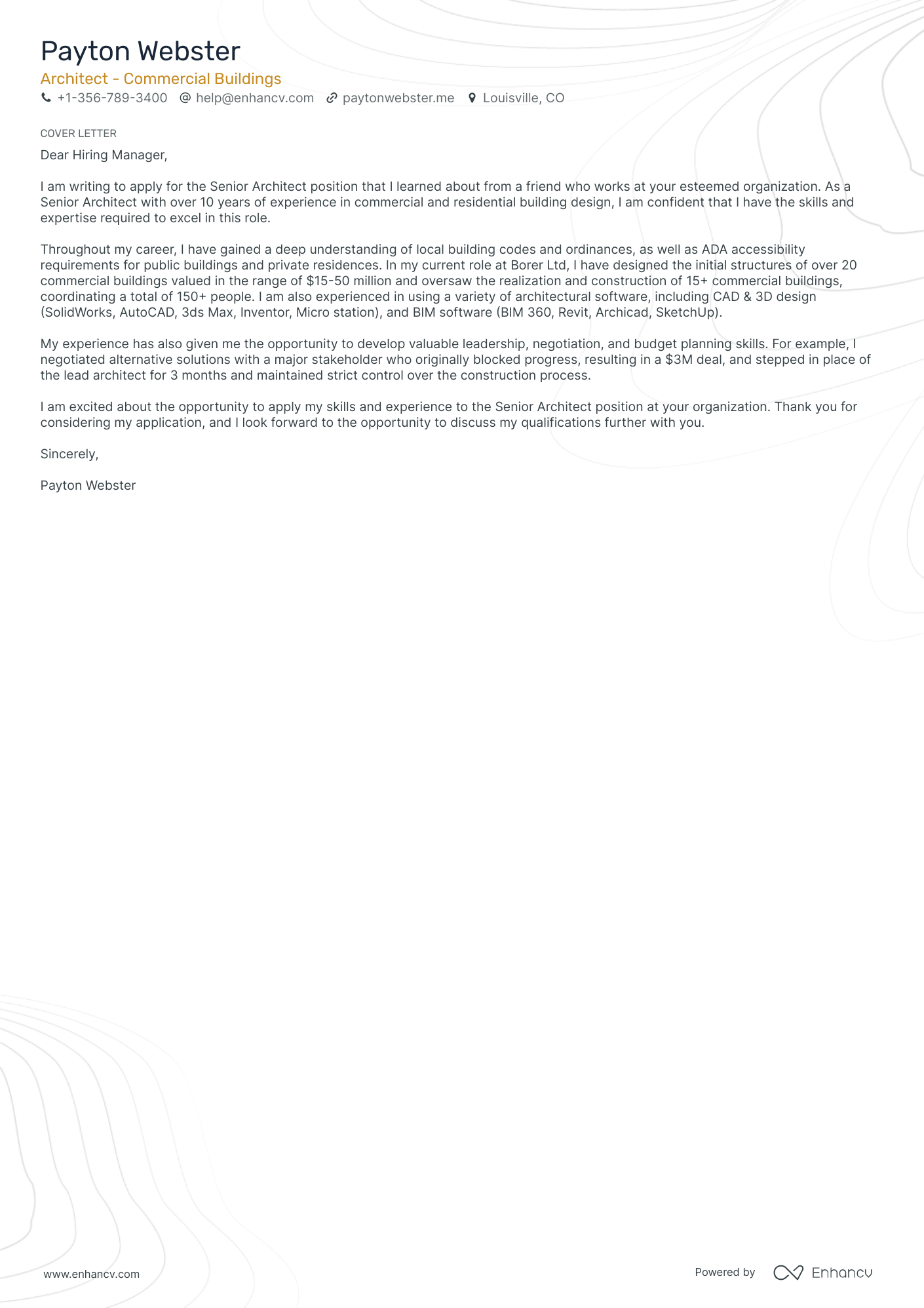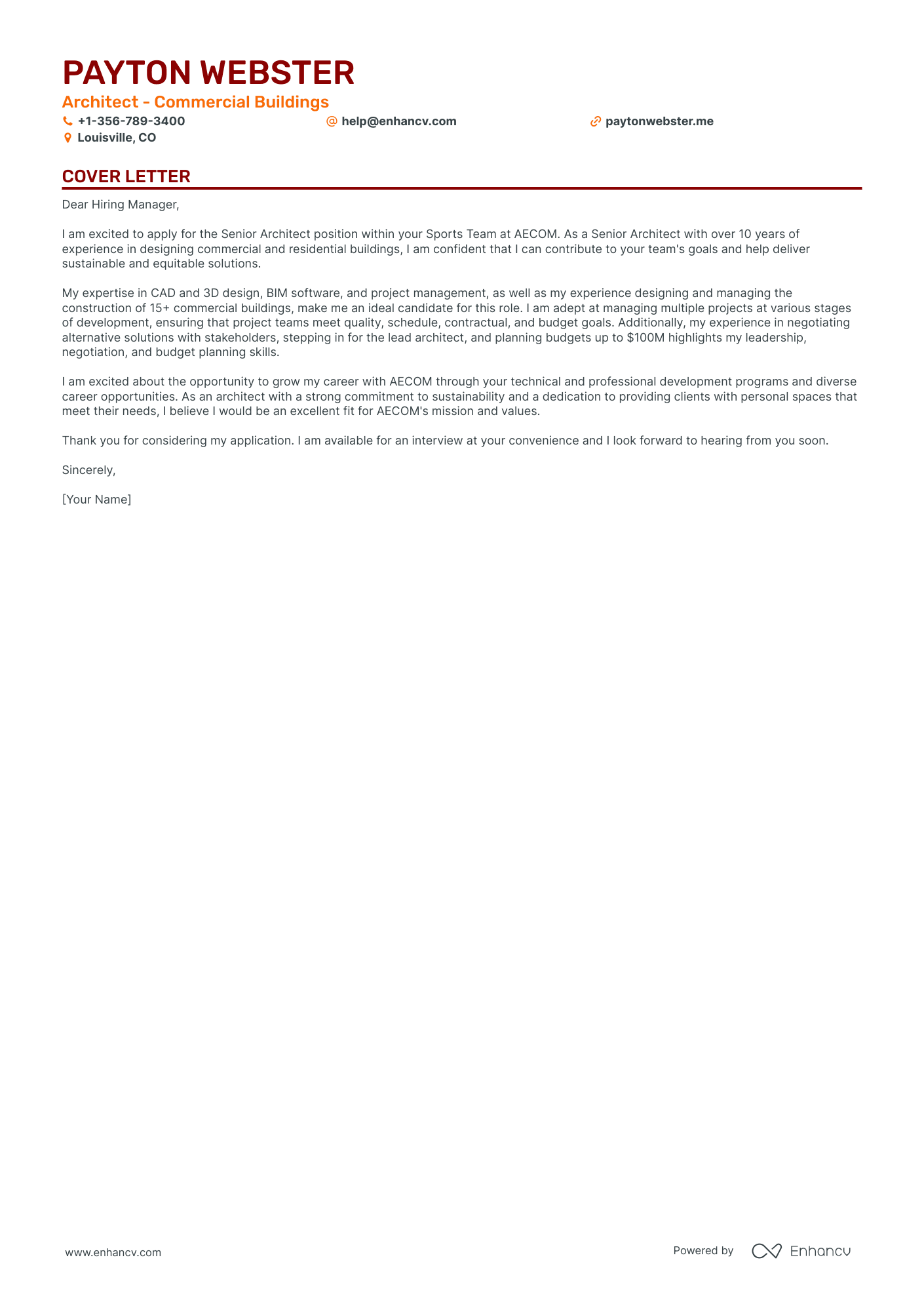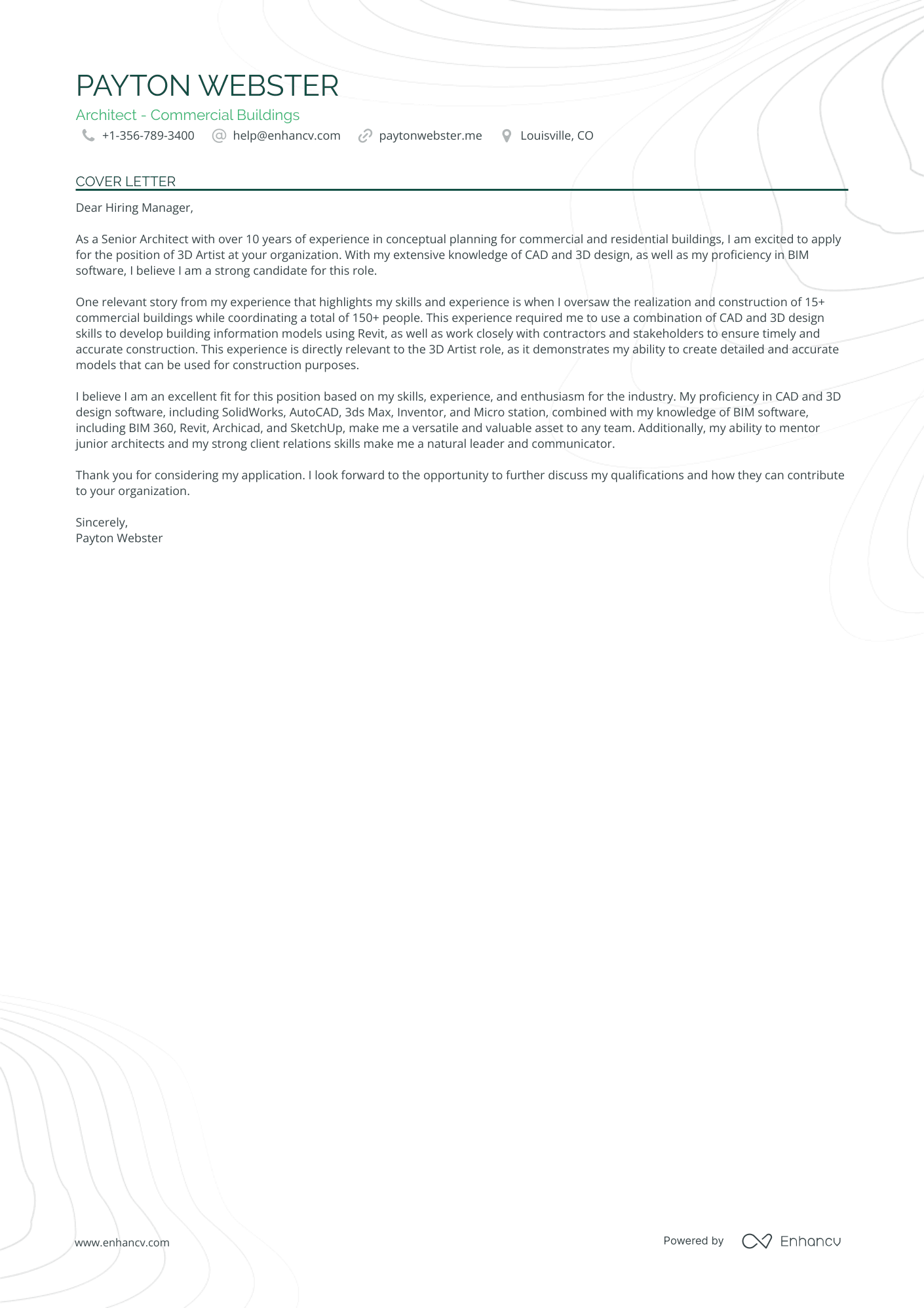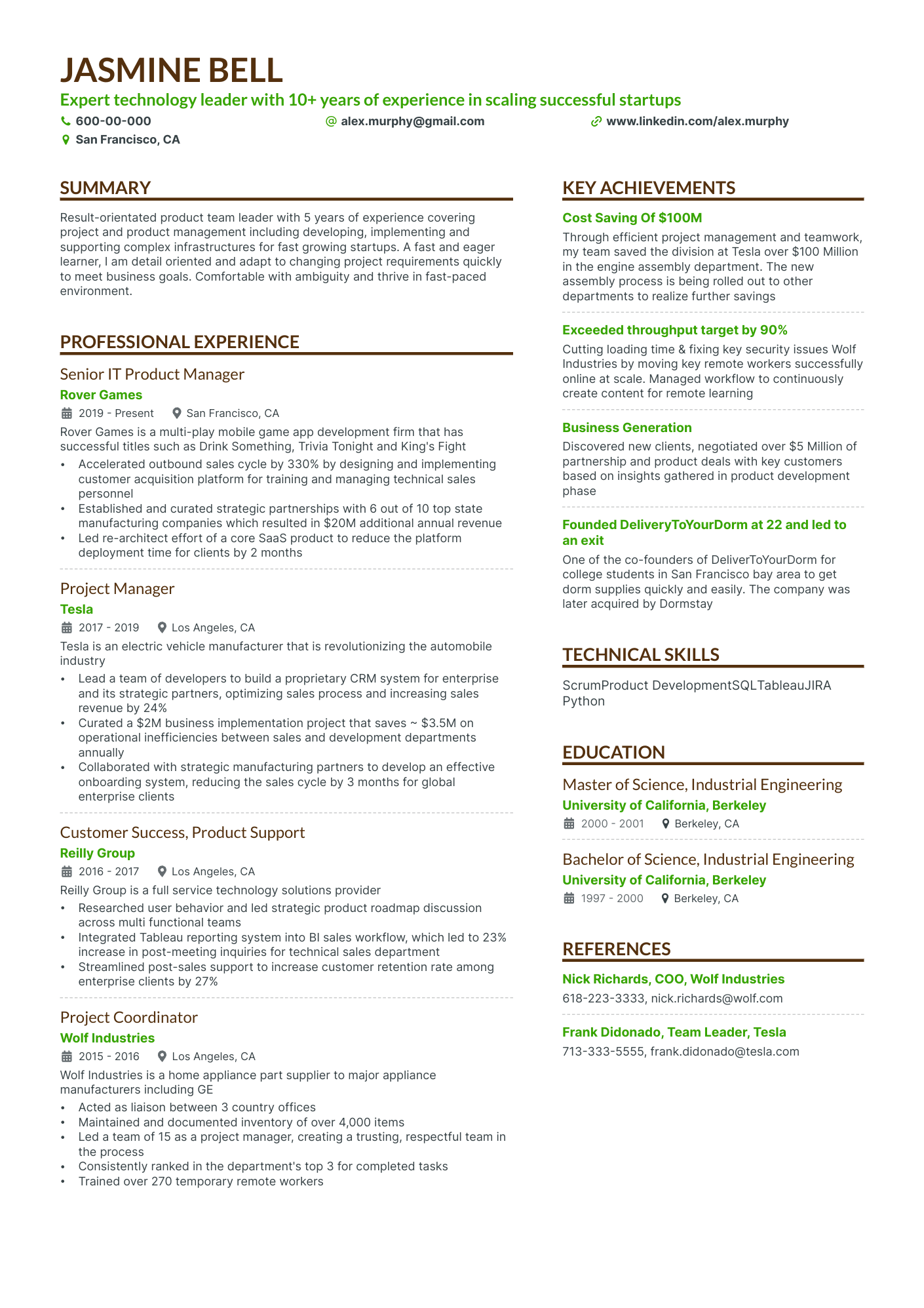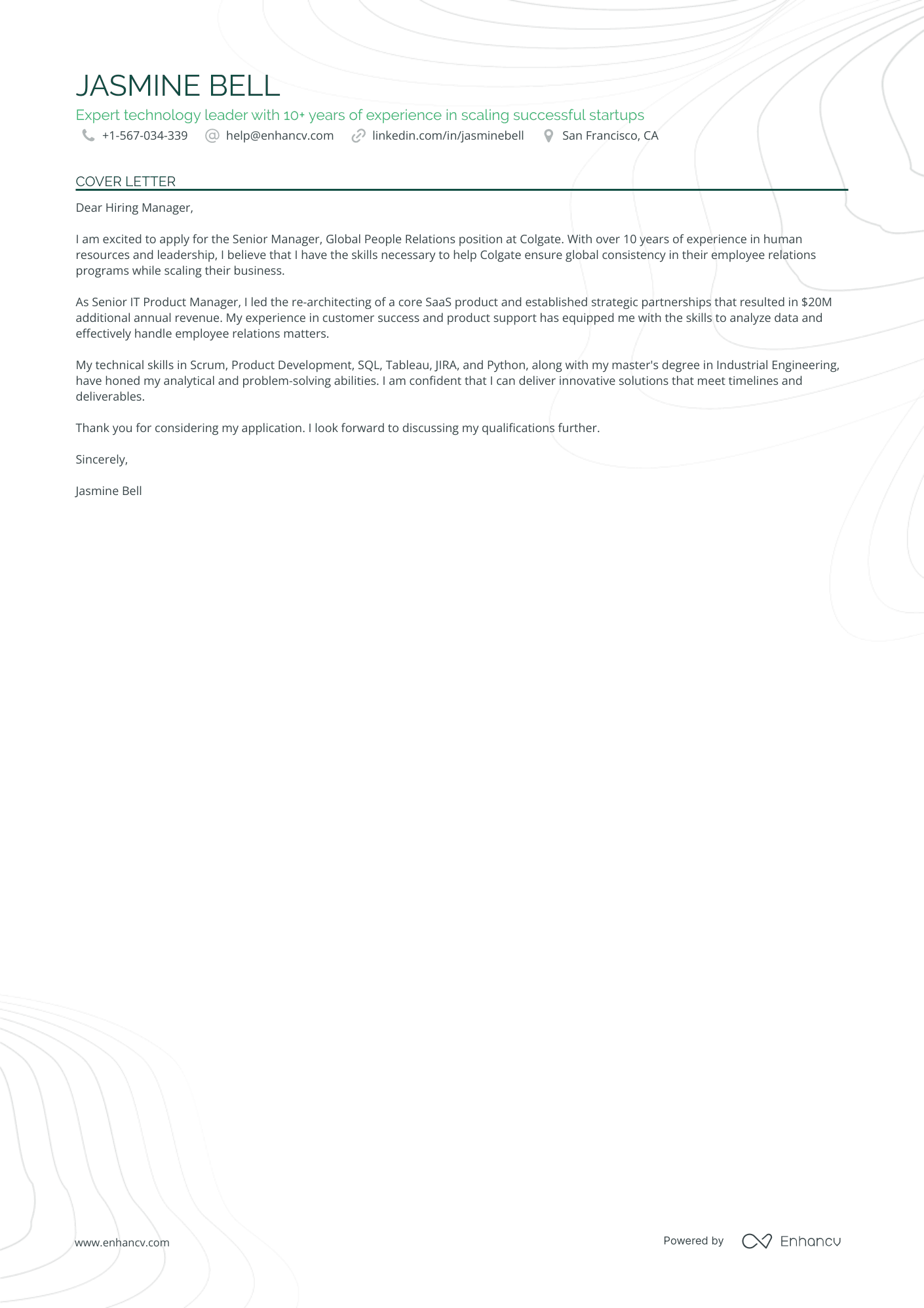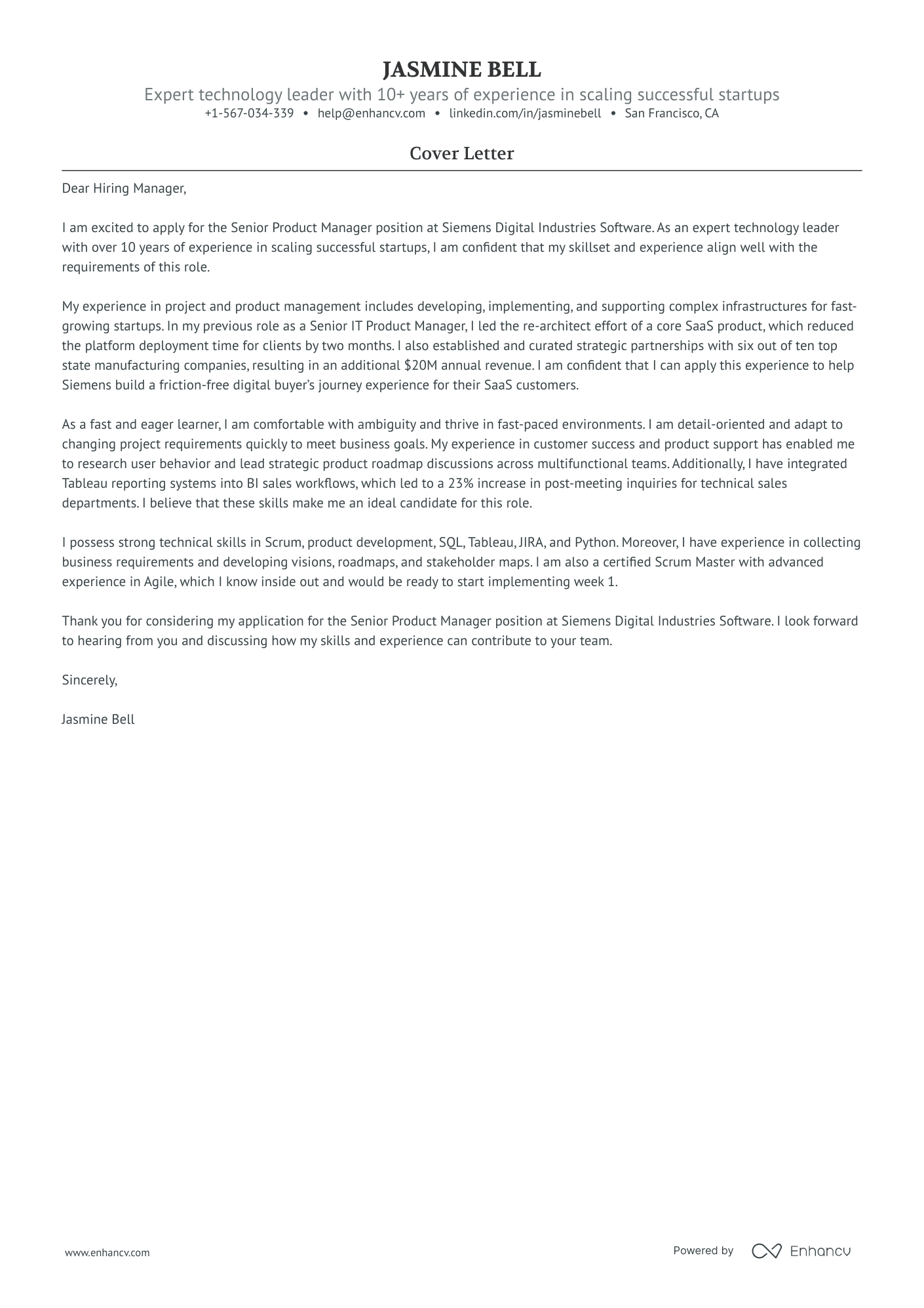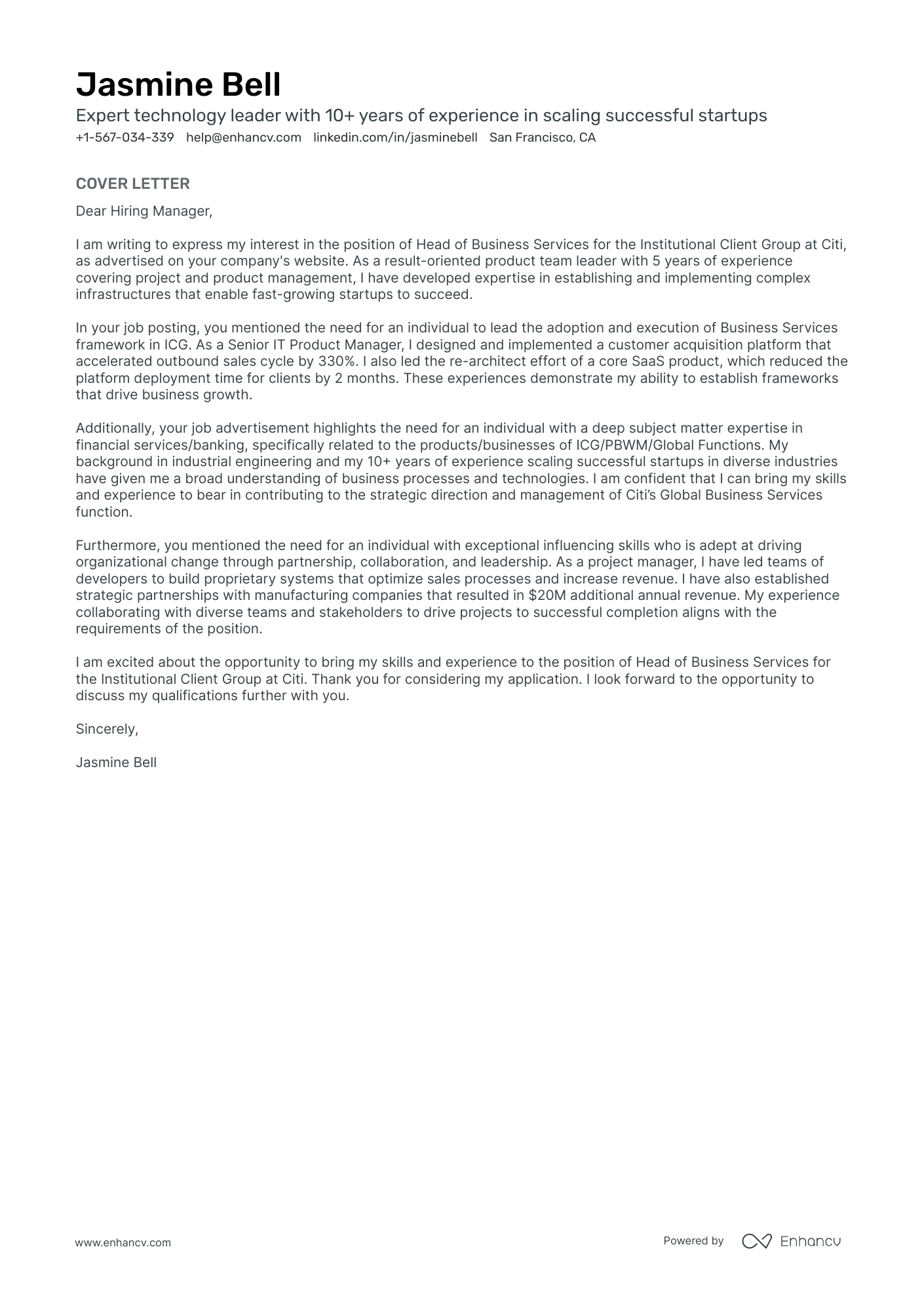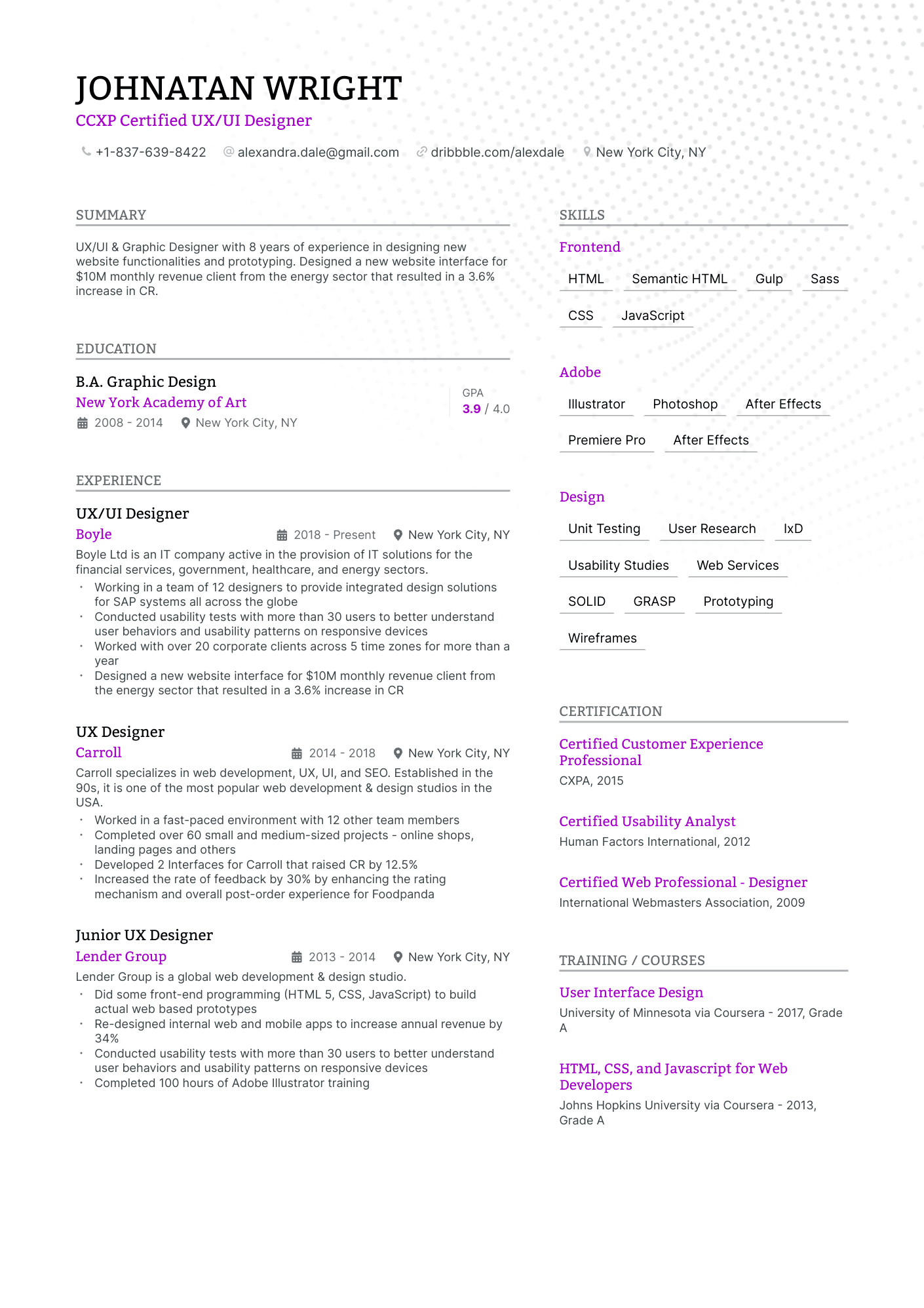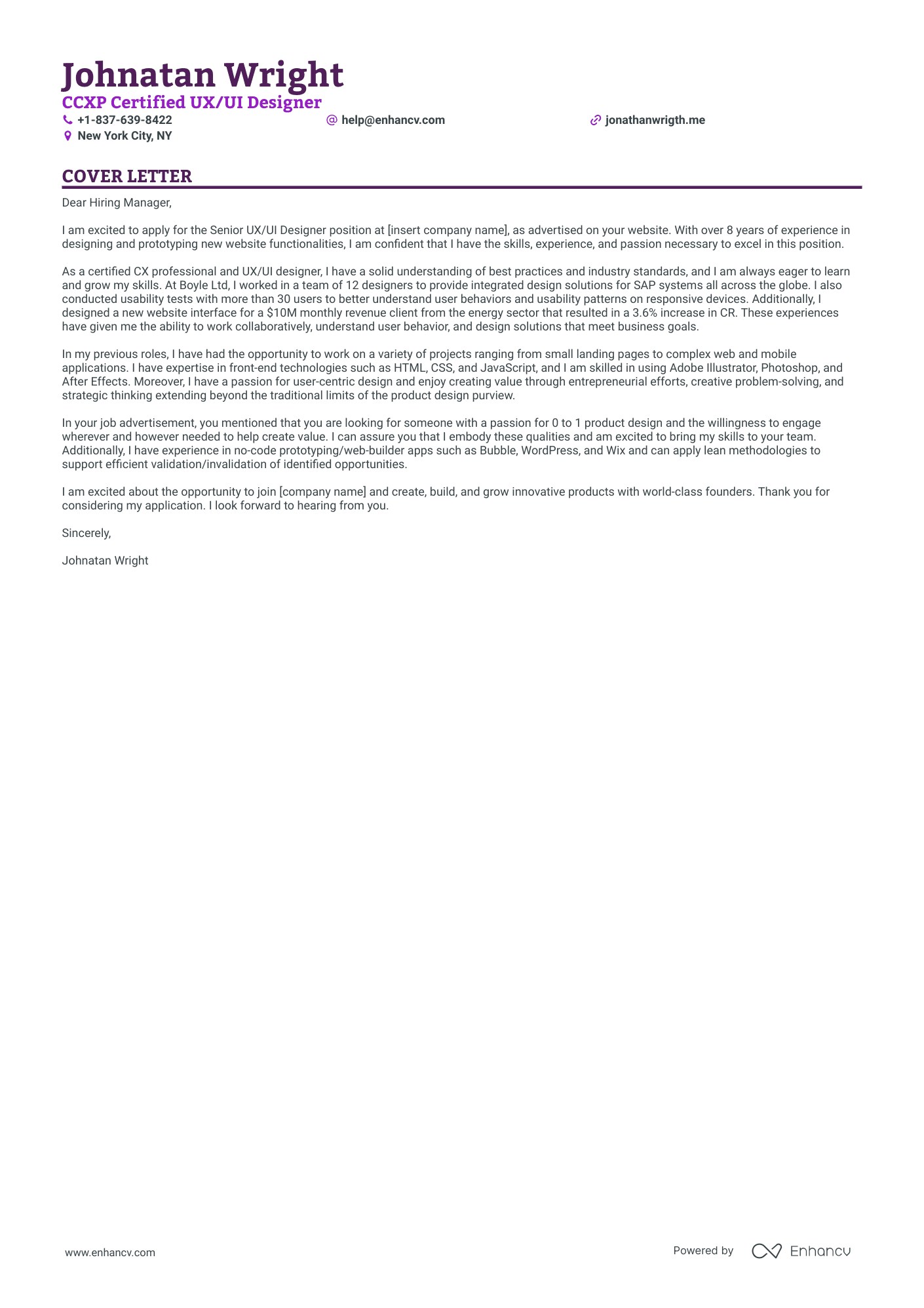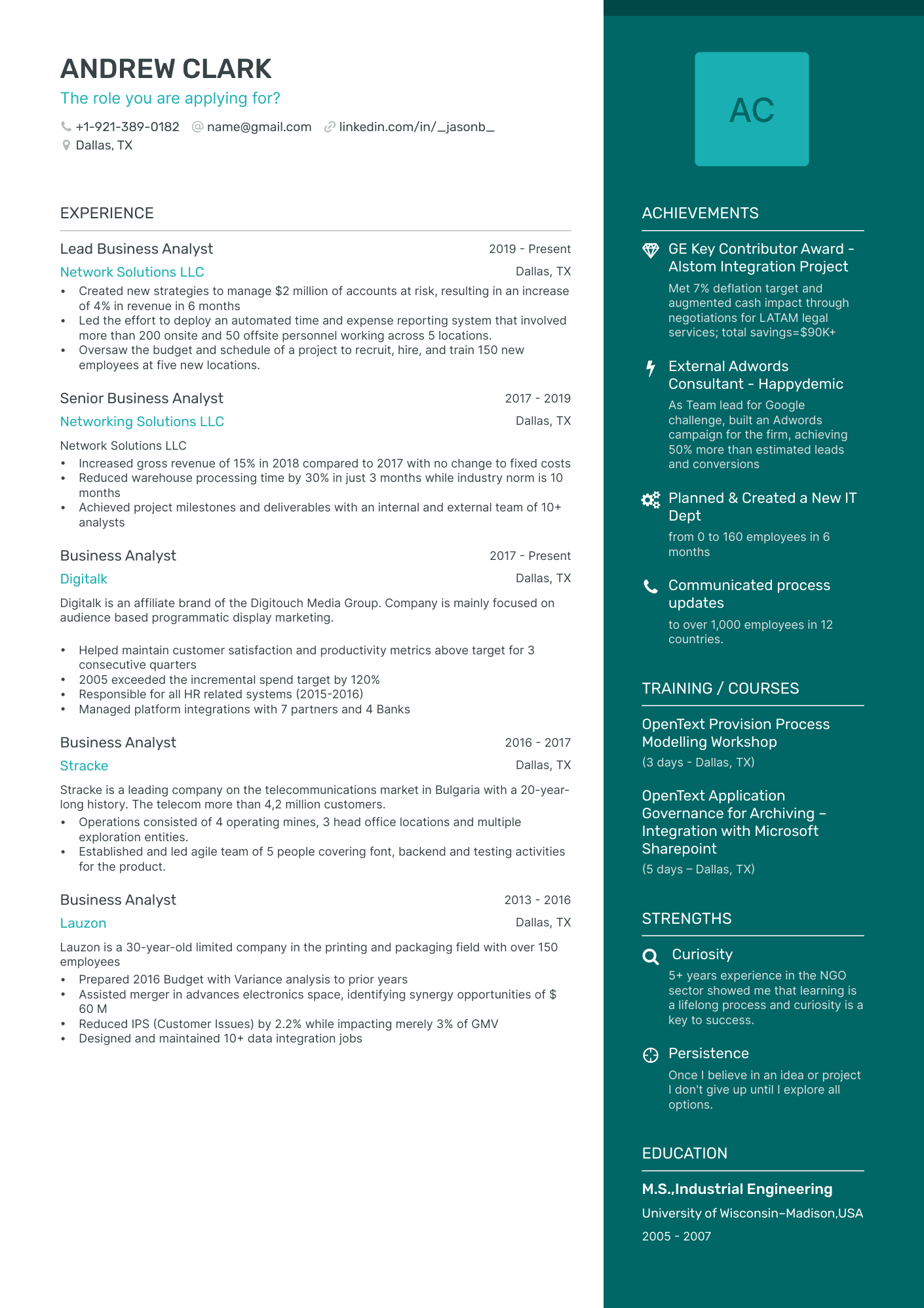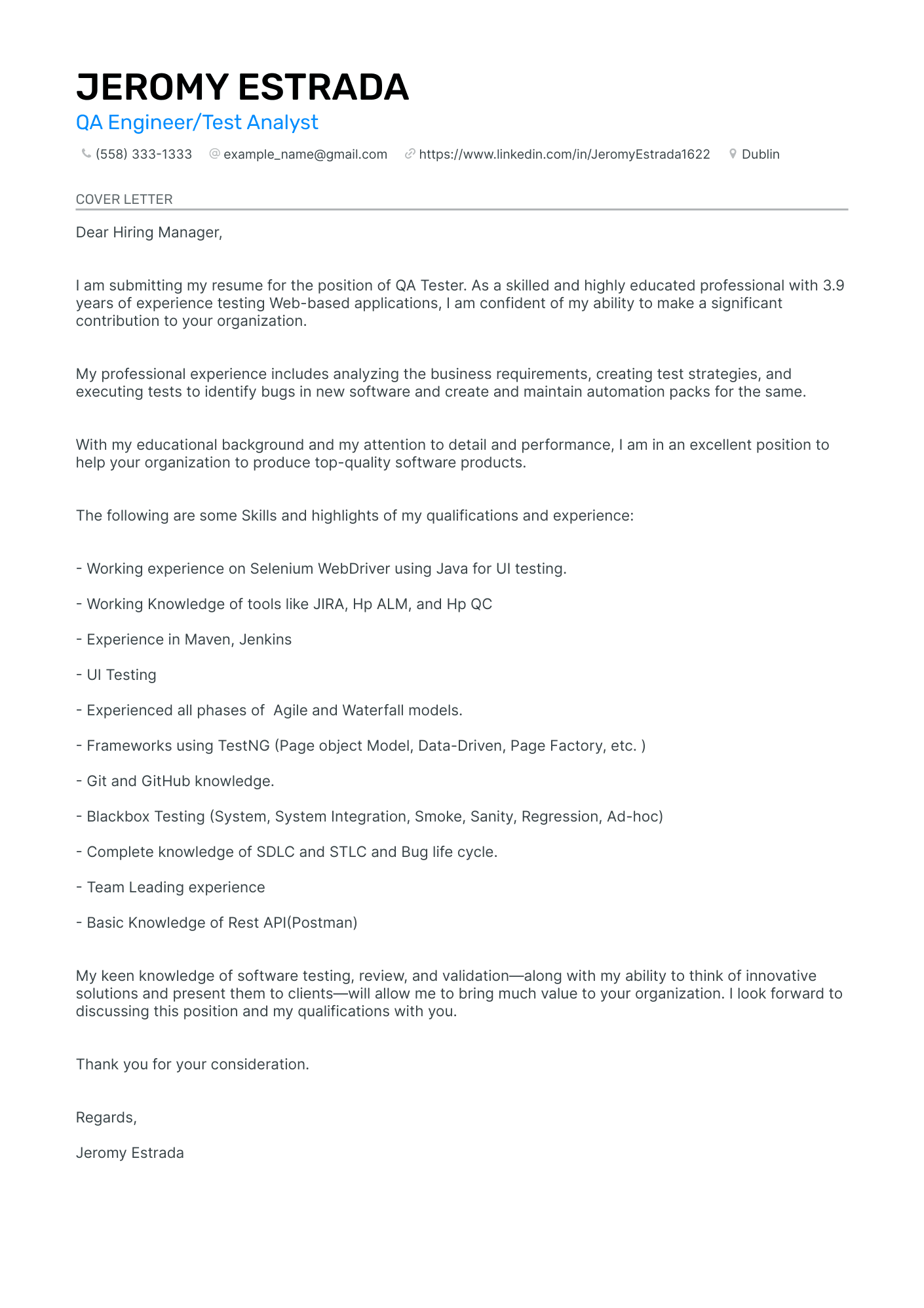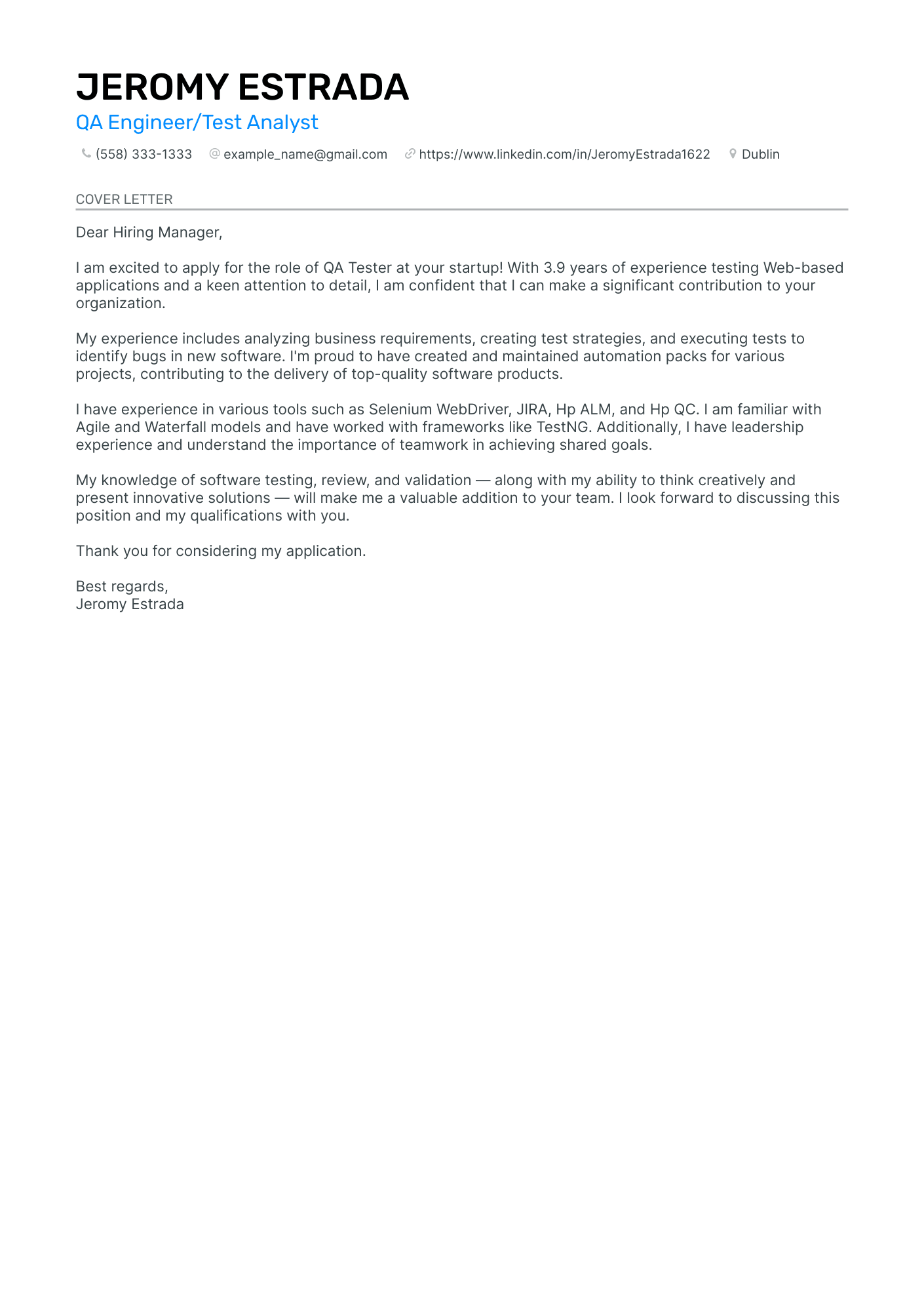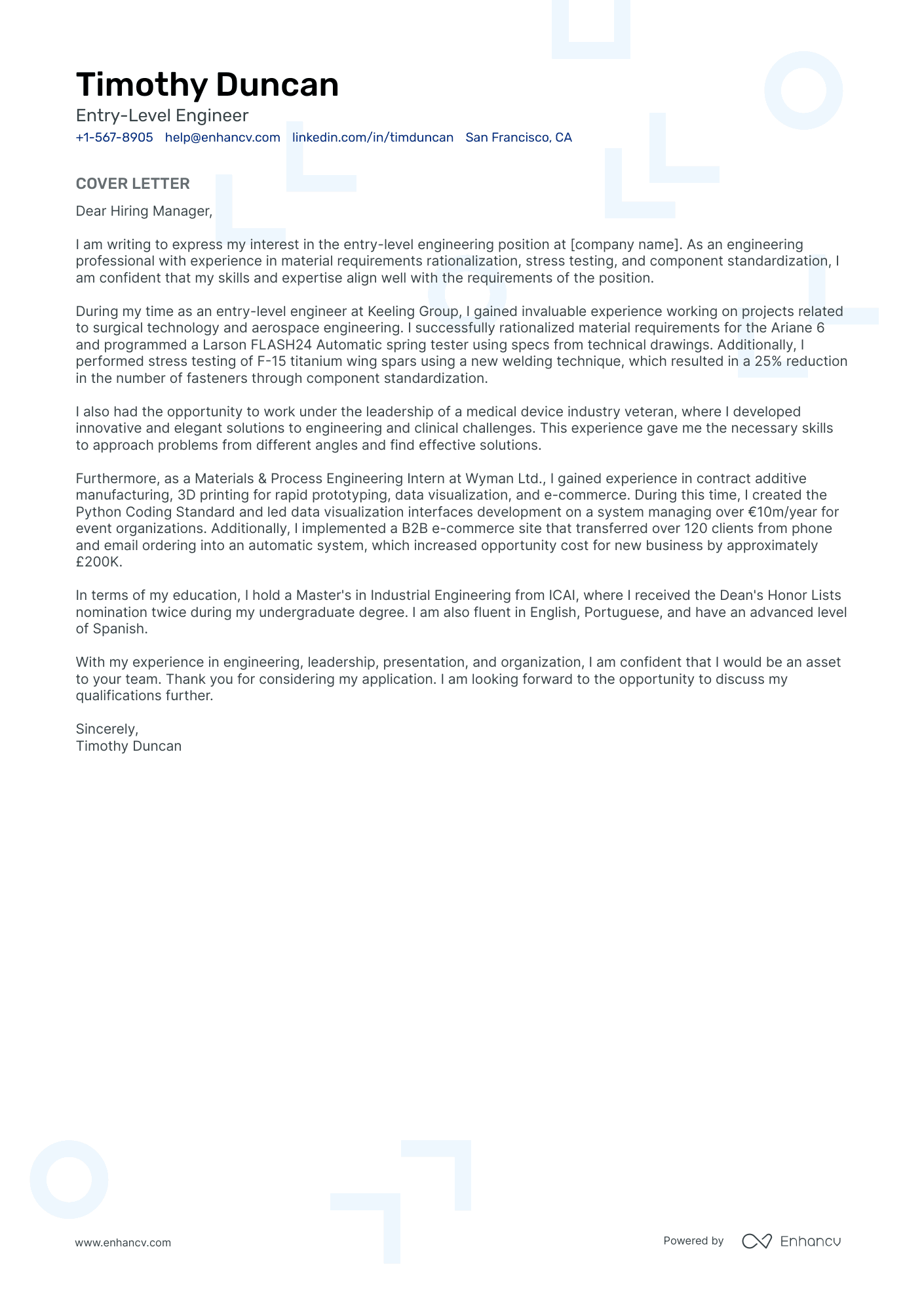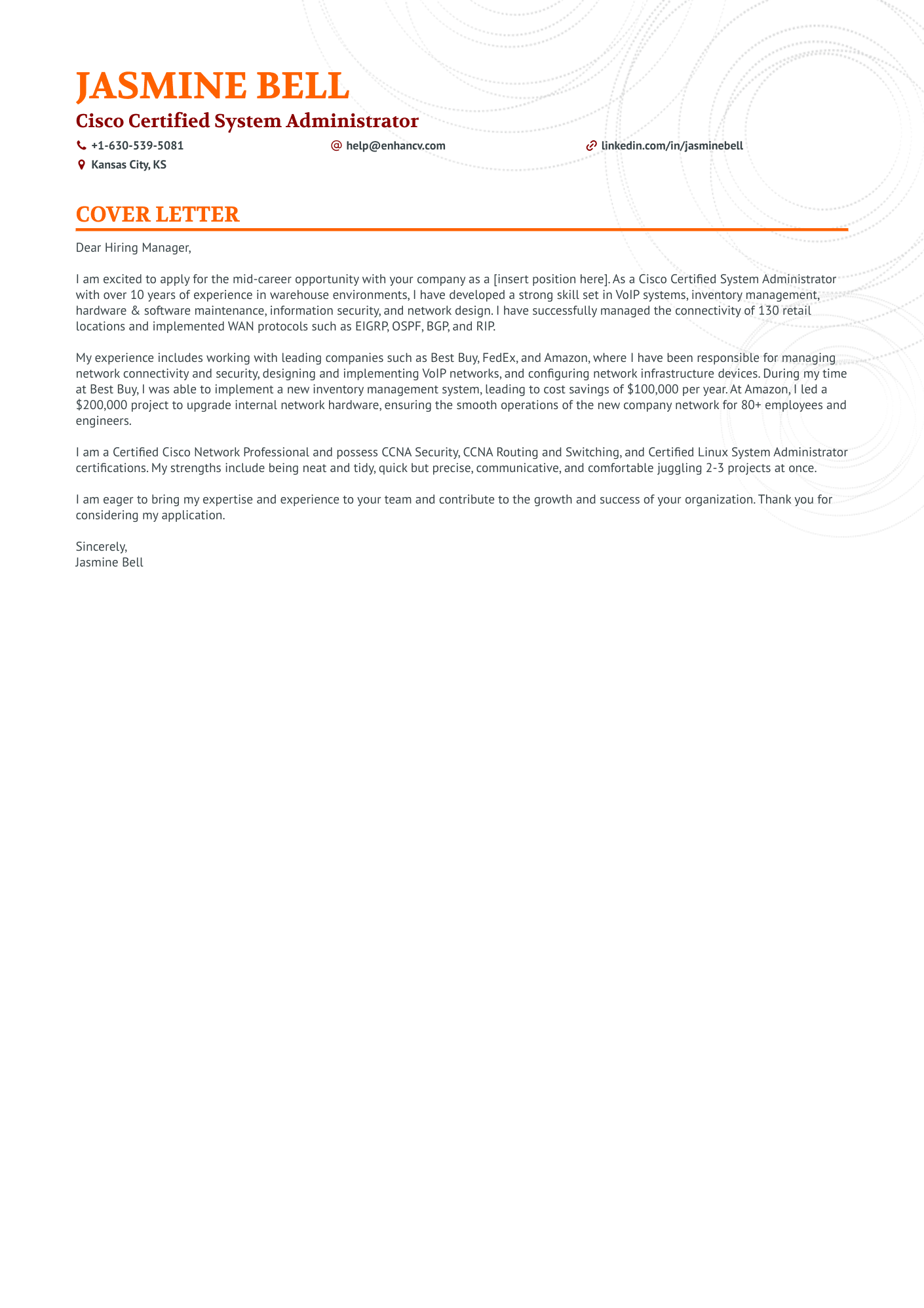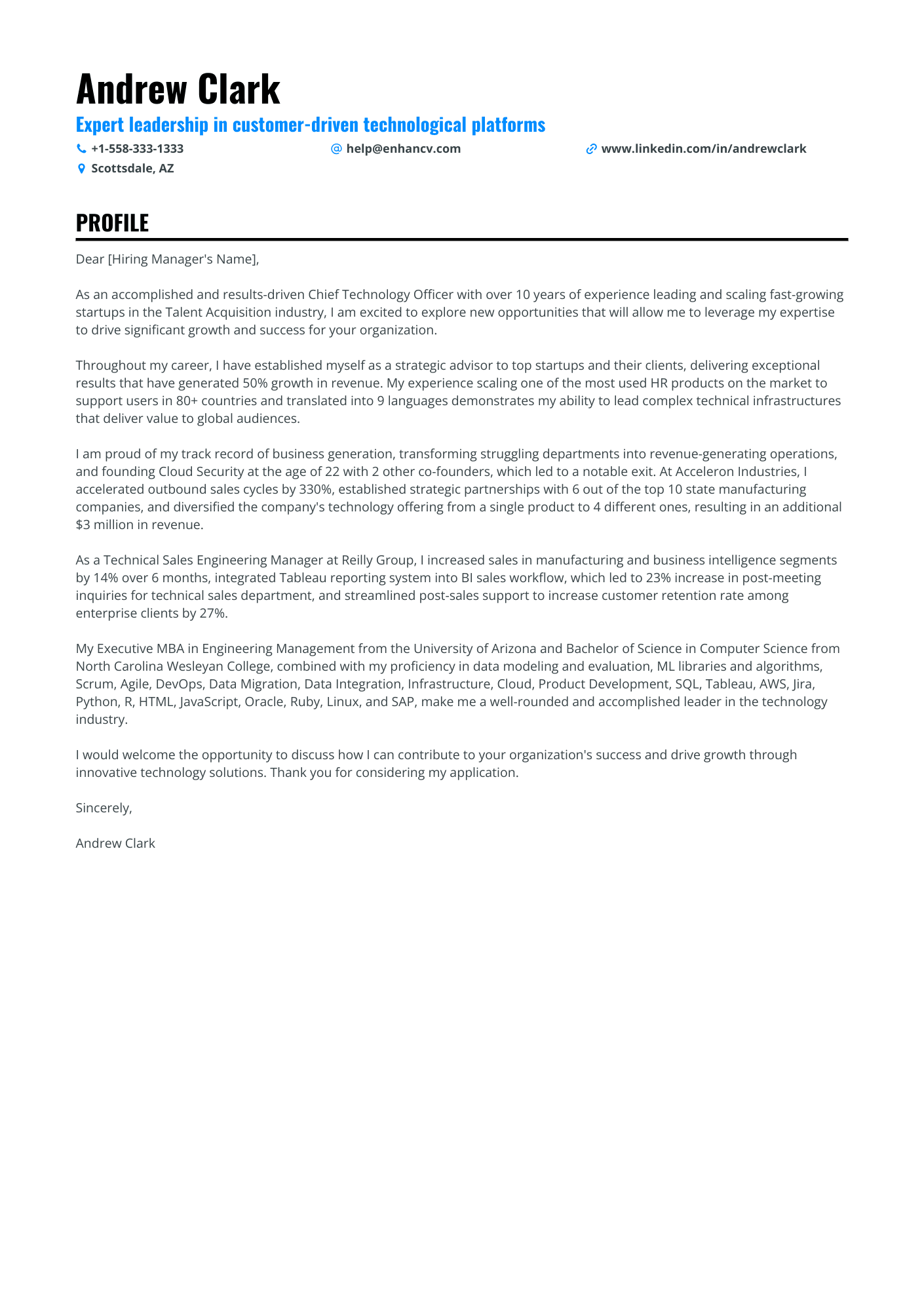Sorting through hundreds of applications for that most coveted role of Senior Network Engineer, you've found three candidates that fit the bill.
All have the relevant experience, yet:
- the first submitted just a resume;
- the second - an impersonal cover letter, solely written by the likes of an AI (e.g. ChatGPT);
- the third candidate has taken the time to study your organization and to align it with their unique skill set.
Highlighting that all three candidates have the same amount of experience...
...wouldn't a well-written cover letter sort of bias you to choose the one that shows the most care (and in some cases - enthusiasm) toward the job and company?
If you're applying for a job, hear us out!
The cover letter isn't just a professional narrative, but the greatest asset to demonstrate your:
- unique value and how your skills match the job;
- interest in the company and role;
- confidence in your abilities.
Your cover letter allows you to shape how your potential employers see your experience. It further highlights what you want them to remember from your resume.
Checklist: Pros to including a cover letter
- increases your chances of landing an interview;
- helps you to stand out with a more personal approach to the job application;
- further sells your experience;
- could help you to fill in (or potentially explain) gaps or discrepancies in your experience;
- can supplement your resume - especially if you lack relevant experience;
- is seen as an advantage, especially for smaller companies, that you've taken the time to get to know their business.
Checklist: Downsides to cover letter writing
- recruiters may be tight on time and may not read it;
- there's some bias about cover letters being an "archaic" practice;
- candidates have gotten (and will continue to get) jobs even without cover letters.
Drop your resume here or choose a file.
PDF & DOCX only. Max 2MB file size.
The choice of writing a cover letter is entirely up to you.
But here's where an ethical question comes in.
What if you simply can't write your cover letter (and can't afford to hire an experienced cover letter writer to help you out)? And you don't have an AI resume builder tool to create it for you, based on your resume?
Would using ChatGPT to your advantage be counted as "cheating"?
Is it ethical to use chatgpt to write your cover letter?
You've probably been living under a rock for the past six months or so if you haven't heard of ChatGPT (Chat Generative Pre-Trained Transformer).
The free language model can supposedly do anything: from debugging codes to pointing out interesting destinations around you.
ChatGPT works as so: you write a prompt (a well-formulated, clear, and concise question or instructions). Within a few seconds, the AI chatbot provides you with a response to your query.
What is more, candidates have been using ChatGPT to restructure their resumes, prepare for interviews, and even write cover letters.
This guide will precisely focus on giving you the know-how of using ChatGPT for your cover letter with:
- Beginners luck: six structures to get to know the writing process;
- The most concise cover letter writing prompt;
- How to align your cover letter to the job;
- More advanced ChatGPT writing prompts for separate cover letter sections;
- Matching the style of the job advert to your cover letter…
… and so much more!
To answer the ethics question of writing a cover letter with ChatGPT, we’ve found a viral story for you.
One that presents you with the biggest “don’t”. Ever.
How not to write a cover letter with ChatGPT
Mandy Tang, a career coach and business owner, was sorting through job applications when she stumbled across a cover letter that covered every single one of her requirements.
"The letter was really well-formed, incredibly well-written, and had literally everything I wanted. But then I looked closer and realized it was just a copy and paste of everything I had put in the job description.”
Mandy Tang, career coach, and business owner
Tang decided to check with ChatGPT what the case was. She pasted in her job advert and told the chatbot to write a cover letter for it.
ChatGPT then regurgitated her requirements: word for word.
So, here's the moral of the story.
Pro tip
If you want to use ChatGPT to help you write a cover letter, be prepared with as much relevant information (including your resume) to get writing. Either copy and paste your resume or use a dedicated AI resume builder to create your cover letters.
Don't just copy-paste the advert in and expect the chatbot to work its magic.
Six cover letter structures to experiment with
How do you differentiate a well-written cover letter from a generic one?
The truth is that excellent cover letters are like diamonds in the rough.
Candidates use them to tell quick stories without diving too much into the nitty-gritty details.
Checklist: Before you start writing your cover letter, prepare
- Information about the company, role, and industry specifics;
- A tailored resume that aligns with the job you’re applying for;
- Company-specific instructions or preferences for the style of writing and what would be counted as impressive achievements (e.g. assess what is the company culture and the type of candidate they’re looking for);
- How do you hope to communicate your career goals within the cover letter;
- Other company information that is relevant to the application (values and mission, recent accomplishments, etc.);
- Patience and time.
Cover letters' main purpose is to catch recruiters' interests by finding the balance between:
- dedicated cover letter space and filler words/ language;
- key skills or achievements without repeating candidate resumes;
- showing authentic interest in the role while highlighting job keywords;
- being specific and personable, yet ticking all the requirement boxes by allowing recruiters to imagine what the candidates' potential would be if they joined the company.
Attaining that level of perfection in cover letter writing sometimes seems impossible.
Here's where the role of ChatGPT comes in.
To kick off this cover letter/ChatGPT writing exercise, we've prepared six structures for you to experiment with.
The end goal is evident: for you to find the one that matches both your experience and the organization you're applying for best.
Without further ado, discover the:
Standardized cover letter prompt
The structure outline commences with a paragraph, where you'd introduce yourself, mention the role you're applying for, and how you've learned about it.
In the next paragraphs, you’d highlight relevant skills, experience, or accomplishments. Ones that align with the job requirements.
The next paragraph would focus on how you can help the company grow.
Sign off with a paragraph about how excited you are for the role and/or company, and thank hiring managers for their time.
Here's the prompt to get you writing:
I want you to act as a cover letter writer. I'd like you to help me write a cover letter that consists of three paragraphs and follows this standardized structure. In the first paragraph, mention the role I'm applying for [Senior Architect] and that I've learned about it [from a friend who works at the company]. Use the next paragraph to highlight any of my relevant skills, experiences, or accomplishments that align with the job. The third and final paragraph should sign off with my excitement for the role. I'd also like to thank the recruiters for their time in assessing my resume and how I look forward to the next stages of the process. Ensure that the cover letter uses professional language and tone and follows industry best practice examples. If you've understood the assessment, can I please paste in my resume?
ChatGPT would next provide you with a template cover letter that follows this structure, which you could edit.
Certainly, I'd be happy to help you write a cover letter for the Senior Architect position. Please feel free to paste in your resume so I can review it and tailor the cover letter accordingly.
Dear Hiring Manager,
I am writing to apply for the Senior Architect position that I learned about from a friend who works at your esteemed organization. With my extensive experience in the field of architecture, I am confident that I have the skills and expertise required to excel in this role.
As a seasoned architect with over 10 years of experience, I have had the opportunity to work on a wide variety of projects, including commercial and residential buildings, public infrastructure, and urban planning. My experience has given me a deep understanding of the design process, from initial concept to final construction, as well as an ability to communicate effectively with clients and stakeholders at all levels. I am also well-versed in the latest architectural software and tools, including AutoCAD, SketchUp, and Revit, which have enabled me to produce high-quality designs and renderings.
I am excited about the opportunity to apply my skills and experience to the Senior Architect position at your organization. I believe that my expertise in architecture and design, as well as my ability to work collaboratively with colleagues and clients, make me an ideal candidate for this role.
Thank you for considering my application for the Senior Architect position. I appreciate the time you have taken to assess my resume, and I look forward to the opportunity to discuss my qualifications further with you.
Sincerely,
[Your Name]
But to go one step further, paste in your resume:
And, voilà:
Of course, this isn't the final version of your cover letter. You'll need to tweak the role you're applying for. But it's a pretty good starting point.
2. Best candidate structure
This cover letter structure is more focused on the specific job you’d be applying for and showcasing to recruiters why they should choose you.
I want you to act as a cover letter writer. I'd like you to help me write a cover letter that consists of three paragraphs and follows this structure. In the first paragraph, highlight details about the company and give specific reasons as to why I'm interested in joining it. Use the next paragraph to highlight any of my relevant skills, experiences, or accomplishments that align with the job. The third and final paragraph should once again highlight why I'm a good fit for the company culture and role. Ensure that the cover letter uses professional language and tone and follows industry best practice examples. Make sure that it's not longer than three paragraphs. If you've understood the assessment, can I please paste in my resume?
Next, paste in your resume and the job advert itself to get a more personalized cover letter for the role.
Here’s my resume: [paste in your whole experience, strengths, achievements, etc.]
Here’s the job I’m applying for: [paste in everything in the job requirements]
The first cover letter ChatGPT produced was a bit too long.
Dear Hiring Manager,
I am writing to express my strong interest in the Senior Architect position within your Sports Team at AECOM. I was impressed by your firm's commitment to delivering sustainable and equitable solutions that improve communities, as well as your dedication to fostering a culture of equity, diversity, and inclusion. As a Senior Architect with over 10 years of experience in designing commercial and residential buildings, I am excited to apply my skills and knowledge to help your team achieve its goals.
Throughout my career, I have developed expertise in CAD and 3D design, BIM software, and project management. I have designed the initial structures of 20+ commercial buildings valued between $15-50 million and managed the realization and construction of 15+ commercial buildings, coordinating a total of 150+ people. Additionally, I have developed building information models using Revit and mentored junior architects in designing major government buildings. My experience in negotiating alternative solutions with stakeholders, stepping in for the lead architect, and planning budgets up to $100M highlights my leadership, negotiation, and budget planning skills.
As a Senior Architect within your Sports Team, I am confident that I can contribute to the development of solutions to complex technical problems in sports-related projects and other public and private sector projects. I am adept at managing multiple projects at various stages of development, ensuring that project teams meet quality, schedule, contractual, and budget goals. My ability to maintain project records and files, review construction documents for compliance with client/project requirements, and lead in the management and preparation of proposals for architectural projects including the development of work effort estimates demonstrates my attention to detail, communication skills, and ability to provide leadership and mentorship of staff and internal project teams.
I am excited about the opportunity to grow my career with AECOM through your technical and professional development programs and diverse career opportunities. As an architect with a strong commitment to sustainability and a dedication to providing clients with personal spaces that meet their needs, I believe I would be an excellent fit for AECOM's mission and values. I am looking forward to the opportunity to contribute to your team and work with a global network of experts who are leading the change toward a more sustainable and equitable future.
Thank you for considering my application. I am available for an interview at your convenience and I look forward to hearing from you soon.
Sincerely,
[Your Name]
That’s why we asked the chatbot to shorten the cover letter using this prompt:
Can you make this cover letter be a bit shorter?
What do you think of ChatGPT’s final writing:
3. Narrative
This is one of the most exciting cover letter outlines out there. Yet, the cover letter is an exercise of focusing more on skill alignment and the organization you’re applying for, than yourself.
We’d recommend you use the narrative structure for your cover letter for instances where the job advert is very much value focused on soft skills and character fit.
Now, it’s story time!
I want you to act as a cover letter writer. I'd like you to help me write a cover letter that consists of three paragraphs and follows this storytelling structure. In the first paragraph, introduce my professional background that is relevant to the job of [3D Artist]. Use the next paragraph to share a relevant story from my experience that demonstrates my skills, experience, or personal qualities. Explain how this story relates to the job requirements. Sum up the cover letter with a paragraph about why I'm a great fit for the role, in terms of skills and enthusiasm for the industry. Use professional language and tone, but at the same time keep this cover letter compact. Follow some best industry practices. If you've understood the task, can I please paste in my resume?
The prompt we’ve provided you with is a bit generic. If you want to go for the gold:
- jot down a few details for ChatGPT about the storyline you want to tell with your experience;
- focus on an industry-wide challenge that you’ve overcome via your experience;
- think about the narrative which would impress recruiters the most and include it in the prompt.
Feel free to edit and add to this ChatGPT prompt, so that your cover letter turns into a real modern-day professional fairy tale.
3. Solution
This framework allows you to present to potential employers your problem-solving skills from the get-go.
It's a very good one for more technical roles.
Here's the prompt you could use:
I want you to act as a cover letter writer. I'd like you to use the following problem-solving structure to write the cover letter. I'll provide you with both the job advert and my resume. In the first paragraph, mention one specific challenge that this company may face, which the role can solve. The next paragraph should focus on how up to three skills and one of my past professional roles make me the perfect candidate to resolve this problem. Finalize with more information about why I'm the perfect candidate for the role. Use professional language and tone, but at the same time keep this cover letter compact. Follow the best cover letter writing practices. If you've understood the task, can I please paste in my resume?
After a shortener prompt, here’s the final result that ChatGPT produced:
3. Skills
This structure is one of the most prominent and useful ones for you. It’d focus on a tailored sales pitch to the role you’re applying for.
I want you to act as a cover letter writer. I'd like you to use the following skill-based structure to write the cover letter. List between 3–5 skills from my experience that are relevant to the job. Use my resume to provide brief examples of how I've used those particular skills in the past. Make sure to include both technical and soft skills. Keep this cover letter to be compact with a maximum of four paragraphs. Use professional language and tone. Follow the best cover letter writing practices. If you've understood the task, can I please paste in both my resume and the job advert?
3. T-Format
The T-format cover letter writing structure matches individual job requirements and keywords with resume experience items.
I want you to act as a cover letter writer. I'd like you to use the following T-format structure to write the cover letter. I'll provide you with both the job advert and my resume. Make this cover letter no more than five paragraphs long. List the job requirements or key skills mentioned in the job posting within the left column. In the right column, provide my provide corresponding experiences and qualifications. Use professional language and tone, while following the best cover letter writing practices. If you've understood the task, can I please paste in both my resume and the job advert?
It provides you with a very structured and easy-to-read end result:
These six structures are a good starting point for writing your cover letter. Of course, the more personalized prompts you provide to ChatGPT, the better the end results would be.
You’d ultimately need to tweak the text - here and there - but this chatbot provides you with excellent food for thought.
Moving on, within the next part of our guide, we’ll look at how the chatbot could help you write more specific cover letter sections.
How to use chatgpt for cover letter writing
The full prompt experience
Okay, so maybe you're struggling with the whole cover letter writing process and need help asap from ChatGPT.
Once again, this is your reminder not to solely rely on technology to write your cover letter. Instead, use it as a starting point to get writing.
Here's a very useful prompt for you.
I want you to act as a cover letter writer. I will provide you with the job advert and my resume. Use this information to create a professional and effective cover letter. Focus the cover letter to be written using the best practices and industry standards. Tailor the cover letter's content to the specific job and company that I am applying to, highlighting my relevant skills and experience. Also, make sure to explain why I am a strong candidate for the position. Please ensure that the cover letter is clear and concise. The cover letter should have appropriate formatting and layout to make it visually appealing and easy to read. Do make sure that it effectively communicates my qualifications and interest in the job. Finally, don't include any personal opinions or statements. I'll first provide you with my resume, then the job advert. Is that okay?
When pasting in your resume, make sure to include all relevant sections, including
- Header
- Summary
- Experience
- Skills (with specific tech stacks)
- Certification
- Training/ Courses
Once again, make sure to include all the relevant items in the job advert.
Here's what ChatGPT came up with:
It's a pretty good effort, but if you're writing a cover letter, you need to go above and beyond.
That means as a rule of thumb, you can surely take what ChatGPT has written for you. But you need to personalize it further to show your character and what makes you stand out.
Aligning resume and job advert
The cursor has been blinking like crazy for the past 20 minutes in your Word document. Looking down at the status bar, the word count is still zero.
You have so much you want to say about yourself, the job, and the company. Yet, your mind is like that blank page in front of you.
From where do you start writing your cover letter?
The first stage of the process is research.
The best candidates don't just go on and on about how skillful they are in Python and/or C++.
But rather - their cover letters show recruiters how their visions and the company's ones for the future align.
Pro tip
Remember: your cover letter is never solely about you, but what you'd bring to the company.
This is one of the most useful ChatGPT prompts to get you writing: discovering how your resume answers the company's pain points.
The experience-job advert alignment prompt
Here's the prompt we've used:
I want you to act as a cover letter writer. I will provide you with information about the job I am applying for and my relevant skills and experience. You will help me discover two things. The first - which areas of my expertise align with the job I'm applying for? The second - what skills would I need to highlight in my cover letter to make a good first impression? Is that understood?
Once you get the good to go from ChatGPT, it's time to paste your resume.
Checklist: In this case, Andrew Clark's resume:
- Experience
- Achievements
- Training/ Courses
- Strengths
- Education
ChatGPT has a bad tendency to fill in the gaps by fabricating any missing information. So, make sure you've pasted in all the information that's relevant to your application.
Next, you have to paste in the job advert. Once again, the more information you can provide to ChatGPT, the better the assessment will be.
We've provided the Senior Business Intelligence Analyst role in full by including:
- Key responsibilities
- Proven characteristics for success
- Personal traits
- Qualifications (both the must-have and the preferred ones)
- Any additional information (about both the company and its offer to candidates)
Asking ChatGPT if the role suits your experience is always a good idea. Here’s what the chatbot told us about Andrew Clark’s resume:
Overall, your experience and skills position you well for the role of a Business Intelligence Analyst. Your cover letter should showcase your relevant experience and highlight your technical and interpersonal skills, as well as your passion for learning and personal attributes that make you a good fit for the company culture.
Find out more about the chatbot's assessment.
It started listing all the crucial requirements for the role that align with the candidate's experience. Those included:
- data analysis
- reporting
- visualization skills
- collecting requirements
- defining reporting standards
- creating dashboards.
Into the specifics, ChatGPT looked into technical skills that it recommends being integrated within the cover letter.
Technical skills that matched the Senior Business Intelligence Analyst role are:
- dealing with large datasets;
- building advanced dashboards with BI tools (e.g. Tableau Desktop);
- data modeling experience;
- SQL and/or Python;
- experience with ETL (e.g. Alteryx).
ChatGPT didn't disappoint with key soft skills either.
The main ones it told us to focus on (based on priority):
- working collaboratively to develop reliable, robust, and self-serve reporting;
- curiosity and passion for learning;
- ability to see the big picture;
- operating with a bias toward action and ownership;
- ability to build lasting and meaningful relationships;
- commitment to quality;
- cultural awareness.
BONUS alignment prompt
Next, we decided to dive deeper into the skills' alignment with this prompt:
Could you be more specific about the skills' alignment between my resume and the job advert? Which ones do you think would be a good idea to focus on, based on my current professional experience?
ChatGPT wanted us to focus on these four crucial areas to land the job:
- Data analysis and modeling: preparing budgets, variance analysis, identifying collaboration opportunities, and data modeling (data and platform integrations).
- Reporting and visualization: creating dashboards and reports; BI tools (e.g. Tableau Desktop).
- Collaboration and communication: working across functions, leadership, and communication across the board.
- Technical skills: SQL, Python, ETL tools.
One final tip from ChatGPT:
In your cover letter, it would be beneficial to focus on your experience with data analysis and modeling, as well as your technical skills, especially your proficiency with BI tools and your knowledge of SQL and/or Python. Additionally, you should highlight your collaboration and communication skills, especially your ability to work across functions and lead teams to achieve shared outcomes.
ChatGPT could help you start writing your cover letter with ideas of areas you can focus on.
Using chatgpt to write various sections of your cover letter
What if you happen to have some experience in cover letter writing and just want to improve your cover letter?
ChatGPT is the perfect assistant that can do that for you.
This next section of our guide is specifically for those more advanced writers. It'll show you how to tailor individual cover letter sections.
Ultimately allowing you to have more control over what ChatGPT writes, while injecting more of your personal style.
Use these prompts to tweak individual sections of your cover letter.
Cover letter introduction and first paragraph
You could use ChatGPT to help you write about…
Something that impressed you about the company
Within the prompt, mention the role you're applying for and the company. You could also specify the tone of voice and your cover letter introduction length.
Pro tip
One of the most important and personalized elements you need to include is what you actually like about the company.
Be honest and as specific as you can possibly be when presenting ChatGPT with the instructions.
Here’s an effective prompt and cover letter introduction by ChatGPT:
Let's build a cover letter introduction for me. I'm a [lawyer, applying for a litigator at Johnson, Johnson & Johnson].
I want to create a custom, authentic, and enthusiastic cover letter introduction of 50 words or less. I want to show that I am genuinely attracted to the company’s brand and have used or followed their products or services before.
A former colleague that referred you to this job
Referencing a colleague is a great starting point for building authentic trust between recruiters and yourself.
Apart from the generic details about the role you're applying for, you could also provide ChatGPT with instructions about
- words it needs to avoid;
- tone of voice;
- introduction length;
- projects you've collaborated on with your former colleague;
- give recognition to the colleague that recommended you.
Check out this prompt:
Let's build a cover letter introduction for me. I'm [a lawyer, applying for a litigator at Johnson, Johnson & Johnson]. I want to create a custom, authentic, and enthusiastic cover letter introduction of 50 words or fewer. I was referred to this job by [a former colleague, Kathryn Hydefield], so mention that connection in my cover letter.
Consider the following as well:
- Avoid using extreme words like “greatest” or “best”
- Show excitement and gratitude
- Keep it brief and let the recommendation speak for itself
- Mention a project you've worked on together previously
- Mention the good intentions of the person recommending you
This is a great starting point, but you'll need to fill in all relevant details.
Your motivations for applying to this job
Perhaps you'd like to start the cover letter with some information about your interest in the role.
ChatGPT can help you restructure your thoughts (and subsequently interest) with this prompt:
Let's build a cover letter introduction for me. I'm [a lawyer, applying for a litigator at Johnson, Johnson & Johnson]. I want to create a custom, authentic, and enthusiastic cover letter introduction of 50 words or less. Please do focus on the reason why I'm applying for the role: [that I'm interested in applying my experience in a more global company].
A great achievement
In some cases, you'll want to kick off your cover letter with one of your greatest achievements.
Style it up with ChatGPT:
Let's build a cover letter introduction for me. I'm a lawyer, applying for [a litigator at Johnson, Johnson & Johnson]. I want to create a custom, authentic, and enthusiastic cover letter introduction of 50 words or less. Write a stand-out opening paragraph that leads with an impressive achievement and features quantifiable results.
Pro tip
Want to make ChatGPT’s job an even easier one?
Prepare in advance your greatest/ most impressive achievement with details of what you’ve achieved.
If the end results are supported by data, you’ll turn into the ultimate cover letter rock star.
Something newsworthy
Maybe the most impressive item of your career is that national award you won last year, recognizing your contributions to string theory research. Or, perhaps, your client feedback remains at a steady AVG of 98%.
Kick off your cover letter with this "newsworthy" ChatGPT prompt:
Let's build a cover letter introduction for me. I'm a lawyer, applying for [a litigator at Johnson, Johnson & Johnson]. I want to create a custom, authentic, and enthusiastic cover letter introduction of 50 words or less. Write a stand-out opening paragraph that mentions something newsworthy (e.g. an award or recognition) and what its implications are to the role or industry.
Your vision
Cover letters are usually about alignment between individuals and the company they’re applying for.
Stating how your ambitions and vision for the future correspond with the company’s ones can open many doors for you.
Let's build a cover letter introduction for me. I'm a [lawyer, applying for a litigator at Johnson, Johnson & Johnson]. I want to create a custom, authentic, and enthusiastic cover letter introduction of 50 words or less. Write a stand-out opening paragraph that mentions how my ambitions for the role align with the company's ones.
All of these six prompts can help you sort the information that you’d like to talk about.
But don’t solely rely on ChatGPT - you have all the talents and skills to present yourself.
Middle paragraphs of your cover letter
Now that you have the intro written, it's time to look at the body of your cover letter.
What these middle paragraphs aim to show is:
- that you've done your homework about the company;
- that you have the relevant skills and experience;
- how you'll help the company succeed, based on your past successes.
Here are three useful prompts you can tailor and experiment with.
1. The research prompt
You know the company; you love the company. What is more, the role you're applying for is precisely what you're looking for.
Want to formulate this more professionally in the body of your cover letter?
I want you to act as a cover letter copywriter. I'm a [junior .net developer], applying for a [.net developer at Tesla]. Help me write the middle paragraphs of the cover letter, which should be no more than 100 words long. Make sure the tone is professional and shows my enthusiasm for the opportunity. Please focus the body of the cover letter on information about the company and why this role would be perfect for me.
2. Highlighting relevant skills, qualifications, and experience
This is one of the biggest questions recruiters are looking to have answered while reading your cover letter:
Do you have the right skills for the job, right now?
ChatGPT can help you communicate this across:
I'm a [communication officer], applying for a [project manager role at Home Depot]. Key skills for the role include [communication and partnership management; meeting project deadlines; and applying the Agile framework to attain results]. I want you to act as a cover letter writer and help me write the middle paragraphs of the cover letter. They should be no more than 100 words long and should sound professional and enthusiastic. One of the most important things to achieve in this section is to highlight the alignment between my experience with those three crucial skills for the role.
When listing this prompt, be specific about the key skill requirements and your experience.
If you want to go above and beyond, you could paste in your resume and the job advert, as we did in the previous sections of this guide.
The new prompt would follow the style of that above and end with something along the lines of:
… I'll first paste in my resume and then the job advert for you. Is that okay?
Once you get the “good-to-go” from ChatGPT, paste in all relevant information and watch the magic happen right before your eyes.
3. Forward-facing
The future is the ultimate sales pitch of your experience.
Rather than focusing just on your strengths, you’d present recruiters with what they’d ultimately get if they hire you.
I'm [an Amazon PPC expert], looking to land a role as [an Amazon Account Manager]. I want you to help me write the body of my cover letter, which should be no more than 100 words long. Make it sound amicable, professional, and enthusiastic. Focus these paragraphs on how my ambitions align with those of [Amazon]. Also, how my unique skill set would bring in success to the company.
Ending of a cover letter and ChatGPT
One of the best ways to end your cover letter is with a promise.
Either of what you'd bring to the table or how this opportunity would help you grow.
Here are the best two prompts you can use to finish off your cover letter with a snap:
I want you to help me write the final sentence of my cover letter. It should be no more than 50 words long, and should sound professional and engaging. Let the sentence show how I'd help [Sears' sales department] grow.
I want you to help me write the final sentence of my cover letter. It should be no more than 50 words long, and should sound professional and engaging. Let the sentence show how the role of [data analyst at Google] would grow my professional skills and abilities.
Edit your cover letter writing style with this chatgpt prompt
This is one of the greatest prompts of all time - let’s say you’ve your cover letter is already complete, but you’re applying to a smaller company.
You’d need to fix the language to sound more easily accessible to the recruiters.
ChatGPT can do that for you:
Can you help me adjust the tone of my cover letter? I've currently written one that it's more professional. I want it to sound more friendly, as I'll be applying for a role within a [startup]. I'll first provide you with my initial cover letter. Is that alright?
You’d next provide your cover letter:
And in just a few seconds, you’d receive:
Checklist: This style prompt could come in handy for you if you’re tailoring your cover letter for a/ an:
- Big four role;
- MAANG role;
- More professional environment;
- Assessment by the CEO of the company.
Including as much as possible from the relevant information would really help ChatGPT tailor and re-write your cover letter.
Three different cover letters based on seniority
Of course, we can’t end this guide without providing you with a few more concrete examples of using ChatGPT to write your cover letter.
So here’s what we were able to produce with the help of the chatbot for
Entry-Level Candidate Cover Letter Example
I want you to act as a cover letter writer. I will provide you with just my resume - I'm an entry-level professional, looking for experience in [Engineering]. Could you please help me write my cover letter?
Mid-Career Level Cover Letter
I'm a [Cisco Certified System Administrator] in the middle of my career. I'm currently looking for a change of pace. I'll provide you with my resume, so you could help me write a cover letter for my mid-career move. The cover letter should be no more than four paragraphs long, sounding ambitious and professional. Use best cover letter writing practices to attain the wanted results. Is it okay if I share my resume with you?
C-Level Exectuve Cover Letter
I'm a CEO currently on the lookout for new opportunities. Once I provide you with my resume, please help me write a cover letter for more senior opportunities. The cover letter should be no more than four paragraphs long, sounding ambitious, professional, yet down to earth. Use best cover letter writing practices to attain the wanted results. Is it okay if I share my resume with you?
Key takeaways
- Prepare all relevant information in advance (that includes both your resume and the job advert) before you start writing with ChatGPT. Remember - the more information you can provide the chatbot with, the more personalized the end results will be.
- Experiment with ChatGPT cover letter writing: the best structure (or final letter) is the one that sounds the most like you while covering the company requirements.
- Use ChatGPT as a starting point - always double-check and tweak its outputs before applying for a role.
- Cover letters are mainly about alignment between your experience and vision to the role you’re applying for. ChatGPT can help you discover all of these patterns that are integral to a successful cover letter.
- ChatGPT can help you to write various sections of your cover letter (introduction, middle paragraphs, and ending), but also match the style of your text to the company’s one.
